
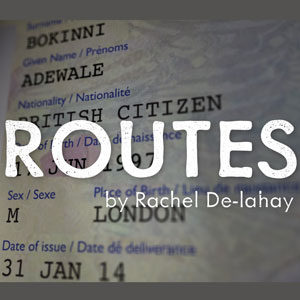 [rating=3]Remy Bumppo Theatre Company’s production of “Routes” is thought-provoking and well-intentioned. Written by Rachel De-lahay and directed by Mikael Burke, this drama has to do with the two black men who face critical issues about their immigration status and their likely deportation from the United Kingdom. Purposefully disjointed and murky, the script is meant to be a deep character portrayal about the lengths to which these men will go to preserve their own lives and try to make a better future for themselves and their families. But with three loosely connected storylines taking place concurrently, the tale is being told in a somewhat confusing manner that detracts from its very disturbing message: having to do with how the current policies of the British government have failed to deal with humane issues concerning immigration among migrants and refugees from Central Africa.
[rating=3]Remy Bumppo Theatre Company’s production of “Routes” is thought-provoking and well-intentioned. Written by Rachel De-lahay and directed by Mikael Burke, this drama has to do with the two black men who face critical issues about their immigration status and their likely deportation from the United Kingdom. Purposefully disjointed and murky, the script is meant to be a deep character portrayal about the lengths to which these men will go to preserve their own lives and try to make a better future for themselves and their families. But with three loosely connected storylines taking place concurrently, the tale is being told in a somewhat confusing manner that detracts from its very disturbing message: having to do with how the current policies of the British government have failed to deal with humane issues concerning immigration among migrants and refugees from Central Africa.
Bashir (Terry Bell) was brought to the United Kingdom as a baby from Somalia. Now that he has turned eighteen, the British government wants to send him “home”: back to a country that he has never known and where he has no family and doesn’t know the language, politics, or culture. He is told on more than one occasion that the situation in the capital of Mogadishu is terrible with all of its crime and violence (with the implication that no one in their rational mind would choose to go there), except the British government is going to send him there anyway! Olufemi (Yao Dogbe) is originally from Nigeria but whose wife and family live in the United Kingdom. Now he wants to do the responsible thing and rejoin them. Anxious not to have to wait for years to have his case wind through the courts, he has decided to pay over $40,000 (Italian) lira and lie about his identity in order to obtain a valid passport and immediately head to Britain. Towards this end, he is coached in his alias by the human trafficker Abiola (Kevin Tre’von Patterson). Unfortunately for Olufemi, he is found out and is destined to be sent back to Nigeria. Throughout the course of the performance, the director radically switches between Bashir’s and Olufemi’s accounts, and the two eventually wind up at the same detention facility but never meet.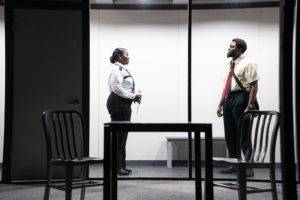
One of the officers at this facility is Lisa (Kristin E. Ellis). She is of the firm belief that the people she oversees must have done something wrong or illegal or else the British government would not be deporting them. But her son Kola (u/s Lucas Looch Johnson) feels quite the opposite. This young man of seventeen is open to the human side of the immigration issue. Hence, a subplot is introduced where Kola was previously kicked out of his house by Lisa because of his use of drugs and was sent to a men’s homeless shelter/recovery center in London. Coincidentally his roommate is Bashir, who is homeless and has no family. As a result of their unlikely meeting, Kola has learned how his friend and roommate has been navigating the legal hassles involved in trying to reside in Britain lawfully. Kola is willing to help out as best he can, which means that, among other things, he tries to put in a good word for Bashir with his mother. At the same time, Lisa wants to become close to Kola again.
Once Bashir and Olufemi separately exhaust their legal options, they each seek empathy from the officials upholding the immigration policy. In Bashir’s case, he works at becoming close to Anka, his white lawyer/advocate (Evelyn Lockley) in the hope that she will see the world through his eyes. He tries to demonstrate to her by force of personality that he is really a good guy. When his circumstances decline and his odds of remaining in Britain appear hopeless, he imagines how he could marry her and therefore avoid being deported to Somalia. This is clearly a flight of fancy which won’t happen for all sorts of reasons, in part because of their age difference and because Anka is already happily married. In Olufemi’s case, he similarly seeks empathy from Lisa, so that he can be reunited with his wife and family. But the groveling only makes both of their situations worse, as the men are being seen as trying to wheedle out of the law. As the two main plots build towards the end, so does the seeming resolution of the subplot regarding the relationship between Kola and his mother Lisa.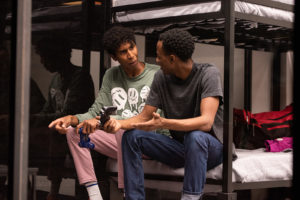
Eric Watkins USA lighting design is fascinating: The color temperature in the fluorescent fixtures constantly changes depending on which of the two (or three) stories we are focusing on. Generally, we are looking at 2200K white LED bulbs for the Olufemi story and 6000K bulbs for the Bashir story. The subplot of Kola and his relationship to his mother utilizes light bulb colors somewhere in between. The lights also serve to differentiate the imagined sets: a detention facility, a men’s homeless shelter, an immigration facility, and Abiola’s private office in subsequent scenes. The lighting in conjunction with a rather simple but effective scenic design by Mara Zinsky makes the stark institutional environment—with its white-walled rooms and hallway and plastic partitions—seem bold and dramatic on one level and ultimately cold and callous. Peter Clare’s sound design is excellent; especially memorable are the loud institutional-sounding clicks that come on whenever the lights shift and mark the beginning and end of scenes. Thanks to scenic change artist Trent Jones, the shifts between each of these scenes is remarkably well achieved.
The most brilliant part of Burke’s directing is the way that the actors occasionally remain on stage motionless while the next set of actors from the alternate story take over in the next scene. Then we see the new actors use the various props very differently, such as bunk beds, tables, chairs, etc. While prop designer Amanda Herrmann has done a fine job with the placement of the props on stage, their very plain and functional design screams IKEA with their newness. I would have preferred seeing more dreariness in the furniture, which needed to show more wear and tear due to sustained use. (Time to bring in the heavy chains and distress the wood and metal!)
Note that this show is heavy on accents and dialect: British, Caribbean, and Nigerian. This makes the dialogue not the easiest to follow for American ears. That being said, dialect coach Sana Selemon should be commended for faithfulness to the spoken word. Also to be commended is the costume design by Gregory Graham. I especially liked Abiola’s military garb and Lisa’s officer uniform.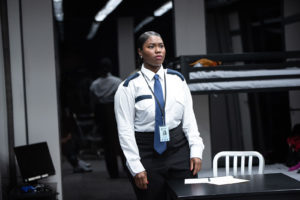
This play brings up a number of questions: “What is home?” “Who defines where one’s home is?” “What does it mean to ‘go home’ or want to go home?” Above all, “Where do we belong?” A related but uncomfortable question is: “What if this need for identification and closeness to others is at odds with our fundamental beliefs and values?” Then there is the unspoken power dynamic among the various characters, and we see how each person internalizes their relationship between subordinate and superordinate, having to do with deferring to governmental authority or trying to subvert it, so as to achieve whatever a given character wants or needs—by whatever route this may take.
“Routes” points up that some people have it really bad in life, and we should count our blessings that we have a warm place to live with food to eat and a roof over our heads and that we are not being torn away from the country we know and love. None of us should ever have to be placed in a position where we become so desperate that we are willing to sell our inner selves short: whether to escape political oppression or intolerable living conditions, or whether to prevent the forced return to a country where our health and well-being—and those of our family members—are at stake.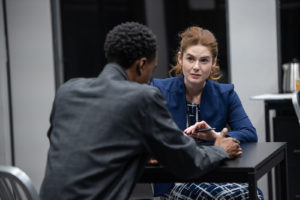
“Routes” runs through November 20, 2022 at Theater Wit, 1229 W. Belmont Avenue, in Chicago.
Tickets: $32.00 – $40.00
Industry Tickets: $15.00, available for all performances
Student Tickets: $10.00, available for all performances
Group Discounts: Available for parties of 10 or more, by calling 773.975.8150.
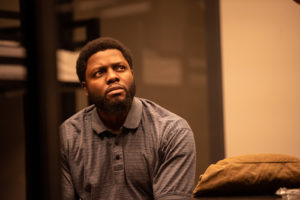 Performance schedule:
Performance schedule:
Thursdays – 7:30 p.m.
Fridays -7:30 p.m.
Saturdays – 7:30 p.m.
Sundays at 2:30 p.m.
Additional matinee performances; all at 2:30 p.m.
Saturday, October 29
Saturday, November 5
Saturday, November 12 and
Thursday, November 17
Audio Description/Touch Tour Performance:
Saturday, October 29, 2022 matinee
Touch Tour starts at 1:00 p.m.; performance starts at 2:30 p.m.
Open Caption Performance:
Saturday, November 5, 2022 at 2:30 p.m.
Subscriptions and single tickets are on sale at https://www.remybumppo.org/shows/routes/ or by calling the Theater Wit Box Office at 773-975-8150.
For general information about Remy Bumppo Theatre, go to: https://www.remybumppo.org/.
Note that COVID protocols are still in effect at Theater Wit. You will be required to show a proof of vaccination card, and masking will be required at all times during the performance itself. Masking in the lobby is recommended except if one is actively eating or drinking.
To see what others are saying, visit www.theatreinchicago.com, go to Review Round-Up and click at “Routes”



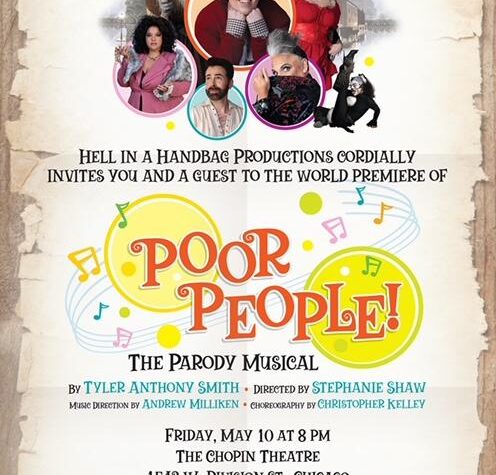
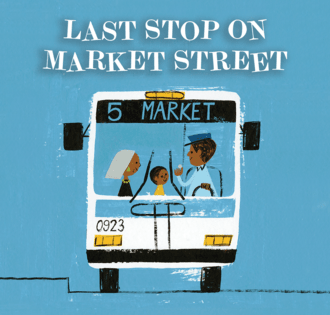

More Stories
“Poor People ! The Parody Musical” Reviewed by Julia W. Rath
“Last Stop on Market Street”
“Miz Cracker” at The Venus Cabaret